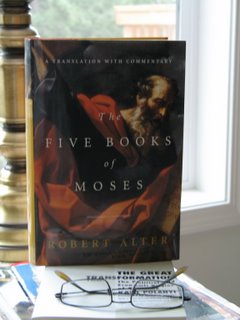
I just bought The Five Books of Moses: A Translation with Commentary by Robert Alter for a price that still makes me shudder. I happened upon it during a short trip to Powells, and having read Alter's incisive Art of Biblical Narrative in college (I highly recommend it.), I knew this book was not to be passed up. And after finishing the introduction, I know the book was worth the expense.
Alter's philosophy of translation is to retain as many of the literary elements in the biblical text as are possible to express in English, and as an accomplished scholar of Hebrew (ancient and modern) and English literature he is qualified to undertake the task. His major criticism of contemporary English Bible [As a Jew, Alter uses the word to refer to the Old Testament.] translations is that in seeking to convey the precise meaning of the Hebrew words and phrases in their immediate context, they loose the levels of speech, puns, rhythm, repetition of words, and other artistic elements present in the original Hebrew on which the literary value of the Bible depends. Alter calls this "the heresy of explanation", for much of the spiritual value of the narratives in the Old Testament (particularly in the Torah and Former Prophets) is dependent upon its literary integrity.
Of course, not all of the literary elements can be perfectly captured in English. So Alter has included a commentary on the text in the form of extensive footnotes which highlight historical, literary, and linguistic items that bring out the meaning of the text. These comments comprise approximately one-third of the text in his book.
Here's an example of Alter's work taken from Genesis 2:5-7.
On the day the LORD God made earth and heavens, no shrub of the field being yet on the earth and no plant of the field yet sprouted, for the LORD God had not caused rain to fall on the earth and there was no human to till the soil, and wetness would well from the earth to water all the surface of the soil, then the LORD God fashioned the human, humus from the soil, and blew into his nostrils the breath of life, and the human became a living creature.Notice how Alter retains the indefinite sense of the Hebrew verbs, translates 'adam in its gender-neutral, universal sense, and works the Hebrew pun into English? Absolutely brilliant. I plan to read this book over the next couple of months and then write a full review contrasting it with Eugene Peterson's The Message.
__________
7. the human, humus. The Hebrew etymological pun is 'adam, "human," from the soil, 'adamah.
Dave,
ReplyDeleteI've browsed through Gen 1-3 and Ex 3 in the Alter's translation of the Torah. It's interesting to compare it to Everett Fox's 'The Five Books of Moses', which is based on the same translation philosophy of making the form of the original as "transparent" as possible in English. Even though Alter and Fox follow the same method, each is strikingly different. Can you possibly do a comparison of The Message, Alter and Fox ?:-). That would be interesting!
Alter had this to say regarding Fox:
ReplyDelete"The one signal exception to [the heresy of explanation] is Everett Fox's 1995 American version of the Torah. Emulating the model of the German translation by Martin Buber and Franz Rosenzweig (begun in 1925, completed in 1961), which flaunts Hebrew entymologies, preserves nearly all repetitions of Hebrew terms, and invents German words, Fox goes to the opposite extreme: his English has the great virtue of reminding us verse after verse of the strangeness of the Hebrew orriginal, but it does so at the cost of often being not quite English and consequently of becoming a text for study rather than a fluently readable version that conveys the stylistic poise and power of Hebrew."
I have not read Fox's translation, but find the Alter's often sounds strange in English. I wonder how Fox's must sound if Alter makes this criticism of him.
Fox's sounds very strange. I was put on to it because Thomas Cahill (of How the Irish Saved Civilisation fame) raved about it.
ReplyDeleteFox is interesting. I read through Genesis 6-9 in his translation and compared it with the NRSV and the JPS Tanakh. The difference between the other two really was often negliable. And the other two had the advantage of sounding more idiomatic!
Fox often reads like an ESL speaker of English. I think the grammar and syntax of the receptor language needs to be more respected, which is what I think Alter is trying to do in his own rendition of the Five Books of Moses